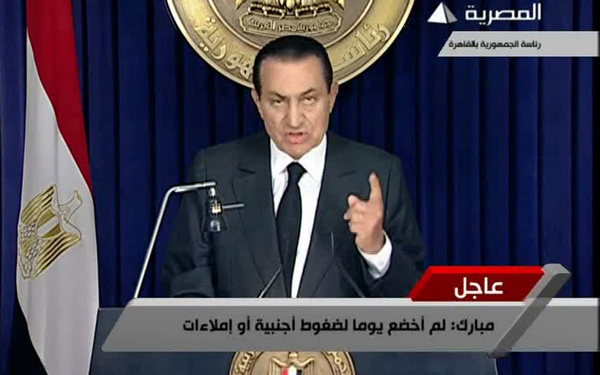Politics
Mubarak hands over power to VP
Updated: 2011-02-11 09:23
(Xinhua)
|
 Egypt's President Hosni Mubarak addresses the nation in this still image taken from video Feb 10, 2011. [Photo/Agencies] |
"According to the constitution, I will shoulder my responsibilities until the country witnesses the stable and peaceful transfer of power in September," Mubarak said.
"I'll transfer power to the vice president according to the constitution," he said, adding that "mistakes are possible in any regime, however, it is vital to admit and hold those who make mistakes accountable."
Some frustrated protesters claimed that they will storm the presidential palace on Friday.
Earlier on Thursday, Mubarak held meetings with Suleiman and Prime Minister Ahmed Shafiq in the presidential palace, local media reported, without providing further details.
Meanwhile, Egyptian Information Minister Ahmad Nabih el-Fekki denied Thursday that the president will step down, saying "he will not hand over his power," in a written scroll on state TV, in response to wide speculation that the 82-year-old president might step down to ease the crisis nationwide.
Thousands of Egyptian workers staged strikes and joined in protests over salary and working conditions in several cities on Thursday amid the nationwide anti-regime demonstration.
On the same day, Egypt's Supreme Council of Armed Forces held a meeting under Hussein Tantawi, commander-in-chief of the armed forces and minister of defense, to discuss measures of maintaining the demands and ambitions of protesters.
A statement released after the meeting said that the armed forces will continue convening to discuss measures to protect the country and meet the aspirations of the Egyptian people.
Before Mubarak's speech, US President Barack Obama said that the United States will continue to support an "orderly and genuine " transition to democracy in Egypt.
"We want all Egyptians to know America will continue to do every thing that we can to support an orderly and genuine transition to democracy in Egypt," he said while visiting the northern state of Michigan.
Obama said the world is witnessing "history unfold" and it is "a moment of transformation" that is happening because Egyptians' calling for change.
In his speech, Mubarak also confirmed six constitutional amendments, including removing one article related to Egypt's state of emergency when security permitted.
The amendments are applied to the presidential candidates' qualification (Article 76), presidential term (Article 77), legal supervision of election (Article 88, 76), court rulings on rigged votes (Article 93), president's use of military justice (Article 179), and amendments to constitution (Article 189).
Meanwhile, Mubarak praised Egyptian young protesters for their efforts, saying "as the president, I don't feel embarrassment in listening to the youths of Egypt and responding to them."
He reiterated that "I cannot and will not accept to be dictated from outside, no matter who is the source."
"The protesters' blood will not be in vain", he stressed, adding that all those behind the violence will be held accountable.
Mubarak added that "I announced that I will not run in the coming presidential elections, and I'm satisfied with the 60 years serving the country in times of war and peace."
He also refused to leave the country as was demanded by the protesters, saying "I will die on the soil."
Mubarak said the national dialogue with the opposition must continue based on national interests, instead of personal ones, calling for "the peaceful transition through transparency."
Following Mubarak's speech, Suleiman asked protesters to return home and resume work in his first televised speech late Thursday.
"As the president delegates me to maintain all demands, achievements and restore normal life, I need your cooperation," Suleiman said, urging that people should keep "self-restraint".
Suleiman said "he was totally committed to achieving peaceful transition of power."
"President Hosni Mubarak's speech affirms his commitment to responding to the demands of the people and making the safety, security and stability of Egypt as a priority above any other consideration," he added.
Leading Egyptian dissident Mohamed ElBaradei warned on Thursday that Egypt was about to "explode" and called on the army to intervene after Mubarak refused to step down.
British Foreign Secretary William Hague, on his part, called for an "urgent but orderly transition."
The European Union's top diplomat Catherine Ashton said that the time for Egypt to secure a change in government "is now."
"The time for change is now," she said in a statement after Mubarak's speech, adding that "we will pay close attention to the response by the Egyptian people in the coming hours and days."
E-paper

Ear We Go
China and the world set to embrace the merciful, peaceful year of rabbit
Preview of the coming issue
Carrefour finds the going tough in China
Maid to Order
Specials

Mysteries written in blood
Historical records and Caucasian features of locals suggest link with Roman Empire.

Winning Charm
Coastal Yantai banks on little things that matter to grow

New rules to hit property market
The State Council launched a new round of measures to rein in property prices.






